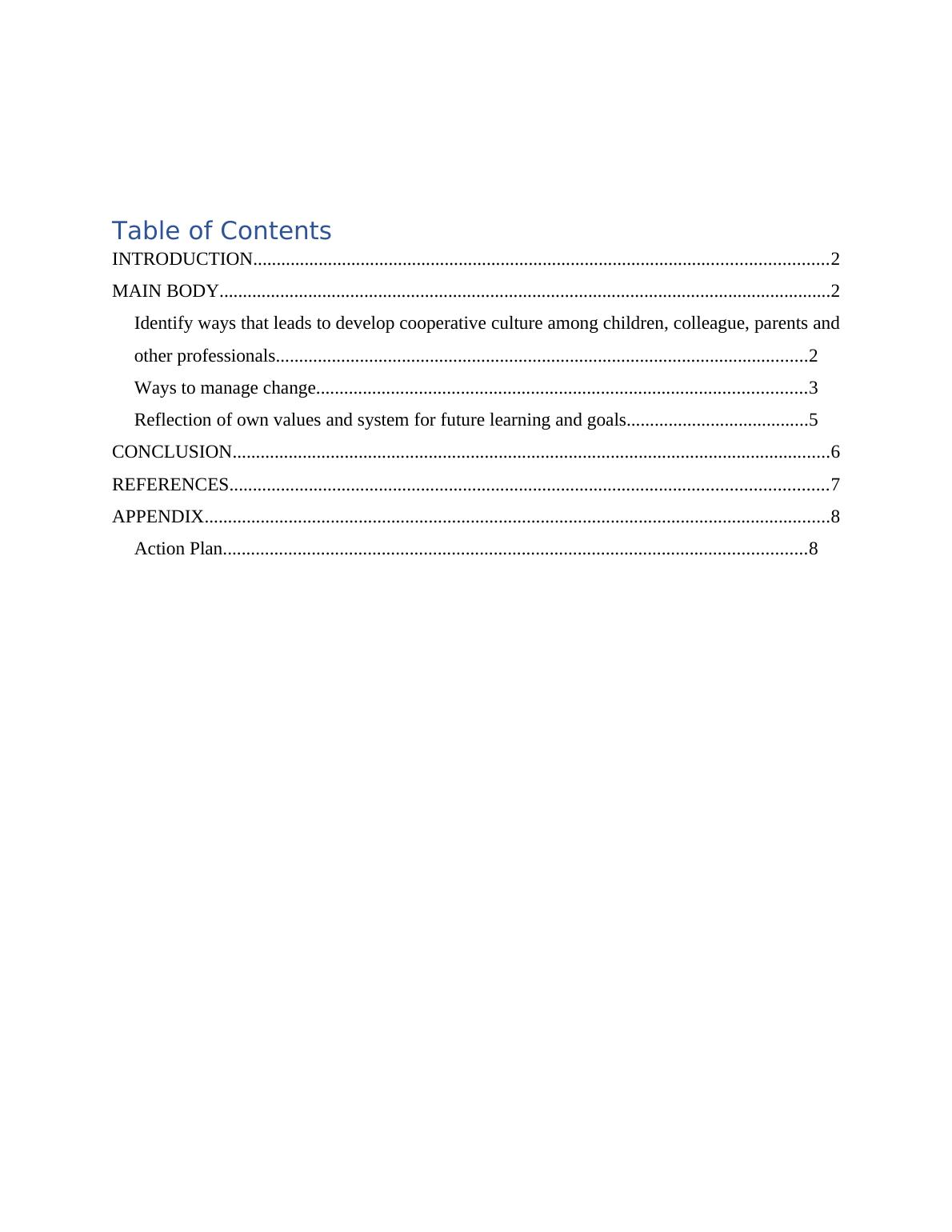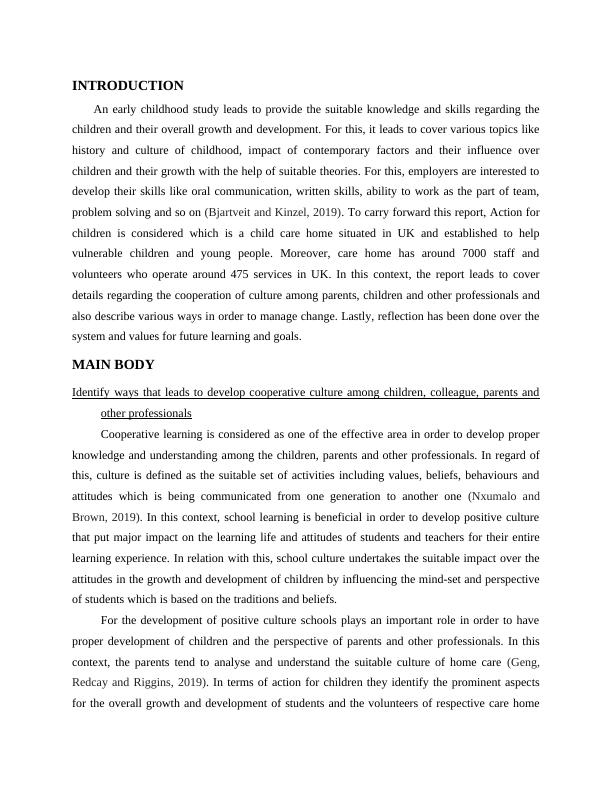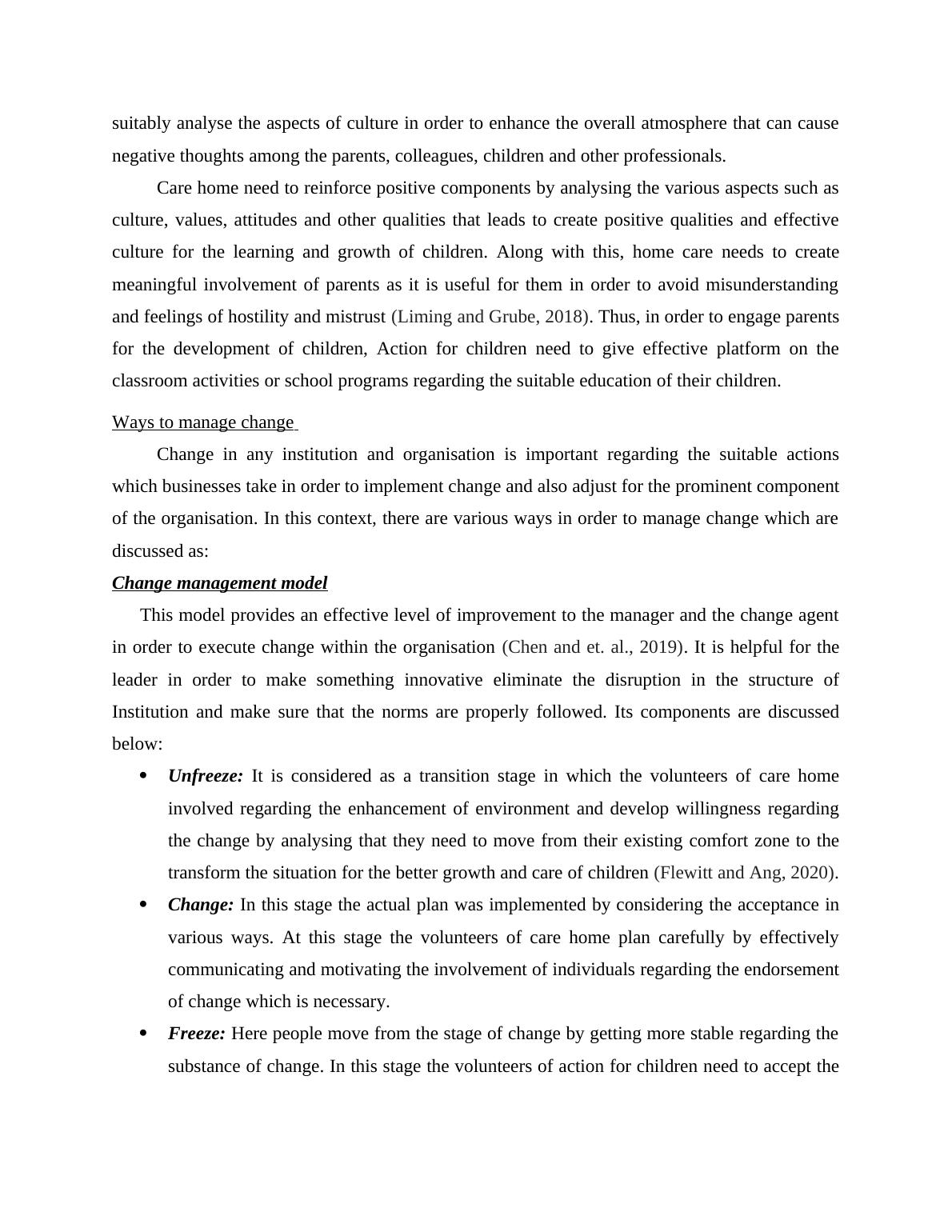Ways to Develop Cooperative Culture in Early Childhood
Added on 2022-12-22
11 Pages3004 Words50 Views
Early childhood studies

Table of Contents
INTRODUCTION...........................................................................................................................2
MAIN BODY...................................................................................................................................2
Identify ways that leads to develop cooperative culture among children, colleague, parents and
other professionals..................................................................................................................2
Ways to manage change.........................................................................................................3
Reflection of own values and system for future learning and goals.......................................5
CONCLUSION................................................................................................................................6
REFERENCES................................................................................................................................7
APPENDIX......................................................................................................................................8
Action Plan.............................................................................................................................8
INTRODUCTION...........................................................................................................................2
MAIN BODY...................................................................................................................................2
Identify ways that leads to develop cooperative culture among children, colleague, parents and
other professionals..................................................................................................................2
Ways to manage change.........................................................................................................3
Reflection of own values and system for future learning and goals.......................................5
CONCLUSION................................................................................................................................6
REFERENCES................................................................................................................................7
APPENDIX......................................................................................................................................8
Action Plan.............................................................................................................................8

INTRODUCTION
An early childhood study leads to provide the suitable knowledge and skills regarding the
children and their overall growth and development. For this, it leads to cover various topics like
history and culture of childhood, impact of contemporary factors and their influence over
children and their growth with the help of suitable theories. For this, employers are interested to
develop their skills like oral communication, written skills, ability to work as the part of team,
problem solving and so on (Bjartveit and Kinzel, 2019). To carry forward this report, Action for
children is considered which is a child care home situated in UK and established to help
vulnerable children and young people. Moreover, care home has around 7000 staff and
volunteers who operate around 475 services in UK. In this context, the report leads to cover
details regarding the cooperation of culture among parents, children and other professionals and
also describe various ways in order to manage change. Lastly, reflection has been done over the
system and values for future learning and goals.
MAIN BODY
Identify ways that leads to develop cooperative culture among children, colleague, parents and
other professionals
Cooperative learning is considered as one of the effective area in order to develop proper
knowledge and understanding among the children, parents and other professionals. In regard of
this, culture is defined as the suitable set of activities including values, beliefs, behaviours and
attitudes which is being communicated from one generation to another one (Nxumalo and
Brown, 2019). In this context, school learning is beneficial in order to develop positive culture
that put major impact on the learning life and attitudes of students and teachers for their entire
learning experience. In relation with this, school culture undertakes the suitable impact over the
attitudes in the growth and development of children by influencing the mind-set and perspective
of students which is based on the traditions and beliefs.
For the development of positive culture schools plays an important role in order to have
proper development of children and the perspective of parents and other professionals. In this
context, the parents tend to analyse and understand the suitable culture of home care (Geng,
Redcay and Riggins, 2019). In terms of action for children they identify the prominent aspects
for the overall growth and development of students and the volunteers of respective care home
An early childhood study leads to provide the suitable knowledge and skills regarding the
children and their overall growth and development. For this, it leads to cover various topics like
history and culture of childhood, impact of contemporary factors and their influence over
children and their growth with the help of suitable theories. For this, employers are interested to
develop their skills like oral communication, written skills, ability to work as the part of team,
problem solving and so on (Bjartveit and Kinzel, 2019). To carry forward this report, Action for
children is considered which is a child care home situated in UK and established to help
vulnerable children and young people. Moreover, care home has around 7000 staff and
volunteers who operate around 475 services in UK. In this context, the report leads to cover
details regarding the cooperation of culture among parents, children and other professionals and
also describe various ways in order to manage change. Lastly, reflection has been done over the
system and values for future learning and goals.
MAIN BODY
Identify ways that leads to develop cooperative culture among children, colleague, parents and
other professionals
Cooperative learning is considered as one of the effective area in order to develop proper
knowledge and understanding among the children, parents and other professionals. In regard of
this, culture is defined as the suitable set of activities including values, beliefs, behaviours and
attitudes which is being communicated from one generation to another one (Nxumalo and
Brown, 2019). In this context, school learning is beneficial in order to develop positive culture
that put major impact on the learning life and attitudes of students and teachers for their entire
learning experience. In relation with this, school culture undertakes the suitable impact over the
attitudes in the growth and development of children by influencing the mind-set and perspective
of students which is based on the traditions and beliefs.
For the development of positive culture schools plays an important role in order to have
proper development of children and the perspective of parents and other professionals. In this
context, the parents tend to analyse and understand the suitable culture of home care (Geng,
Redcay and Riggins, 2019). In terms of action for children they identify the prominent aspects
for the overall growth and development of students and the volunteers of respective care home

suitably analyse the aspects of culture in order to enhance the overall atmosphere that can cause
negative thoughts among the parents, colleagues, children and other professionals.
Care home need to reinforce positive components by analysing the various aspects such as
culture, values, attitudes and other qualities that leads to create positive qualities and effective
culture for the learning and growth of children. Along with this, home care needs to create
meaningful involvement of parents as it is useful for them in order to avoid misunderstanding
and feelings of hostility and mistrust (Liming and Grube, 2018). Thus, in order to engage parents
for the development of children, Action for children need to give effective platform on the
classroom activities or school programs regarding the suitable education of their children.
Ways to manage change
Change in any institution and organisation is important regarding the suitable actions
which businesses take in order to implement change and also adjust for the prominent component
of the organisation. In this context, there are various ways in order to manage change which are
discussed as:
Change management model
This model provides an effective level of improvement to the manager and the change agent
in order to execute change within the organisation (Chen and et. al., 2019). It is helpful for the
leader in order to make something innovative eliminate the disruption in the structure of
Institution and make sure that the norms are properly followed. Its components are discussed
below:
Unfreeze: It is considered as a transition stage in which the volunteers of care home
involved regarding the enhancement of environment and develop willingness regarding
the change by analysing that they need to move from their existing comfort zone to the
transform the situation for the better growth and care of children (Flewitt and Ang, 2020).
Change: In this stage the actual plan was implemented by considering the acceptance in
various ways. At this stage the volunteers of care home plan carefully by effectively
communicating and motivating the involvement of individuals regarding the endorsement
of change which is necessary.
Freeze: Here people move from the stage of change by getting more stable regarding the
substance of change. In this stage the volunteers of action for children need to accept the
negative thoughts among the parents, colleagues, children and other professionals.
Care home need to reinforce positive components by analysing the various aspects such as
culture, values, attitudes and other qualities that leads to create positive qualities and effective
culture for the learning and growth of children. Along with this, home care needs to create
meaningful involvement of parents as it is useful for them in order to avoid misunderstanding
and feelings of hostility and mistrust (Liming and Grube, 2018). Thus, in order to engage parents
for the development of children, Action for children need to give effective platform on the
classroom activities or school programs regarding the suitable education of their children.
Ways to manage change
Change in any institution and organisation is important regarding the suitable actions
which businesses take in order to implement change and also adjust for the prominent component
of the organisation. In this context, there are various ways in order to manage change which are
discussed as:
Change management model
This model provides an effective level of improvement to the manager and the change agent
in order to execute change within the organisation (Chen and et. al., 2019). It is helpful for the
leader in order to make something innovative eliminate the disruption in the structure of
Institution and make sure that the norms are properly followed. Its components are discussed
below:
Unfreeze: It is considered as a transition stage in which the volunteers of care home
involved regarding the enhancement of environment and develop willingness regarding
the change by analysing that they need to move from their existing comfort zone to the
transform the situation for the better growth and care of children (Flewitt and Ang, 2020).
Change: In this stage the actual plan was implemented by considering the acceptance in
various ways. At this stage the volunteers of care home plan carefully by effectively
communicating and motivating the involvement of individuals regarding the endorsement
of change which is necessary.
Freeze: Here people move from the stage of change by getting more stable regarding the
substance of change. In this stage the volunteers of action for children need to accept the

End of preview
Want to access all the pages? Upload your documents or become a member.
Related Documents
Technology in Early Childhood: Impact, Concerns, and Solutionslg...
|11
|3810
|369
Early Childhood Education and Care: Strategies for Promoting Social Competencelg...
|7
|1862
|309
How Parents and Family Can Contribute Directly to Early Childhood Curriculumlg...
|6
|981
|405
Role of Leadership in Collaborating with Families and Communitieslg...
|12
|2913
|257
Importance of Early Childhood Education and Parental Involvementlg...
|17
|4443
|190
Early Childhood Education and Care: Cultural Awareness and Ethical Considerationslg...
|13
|3402
|268
